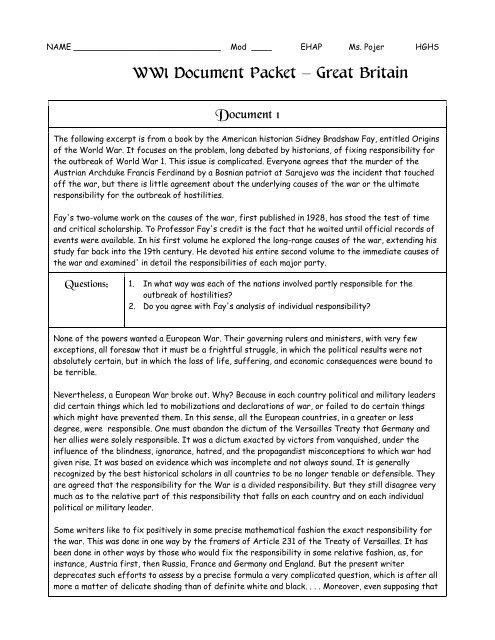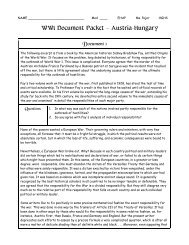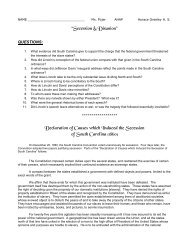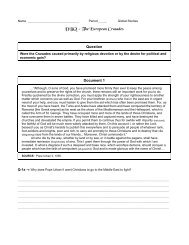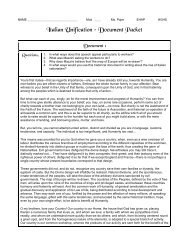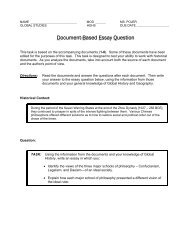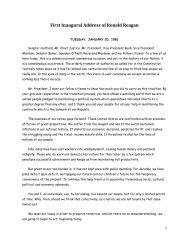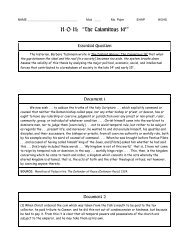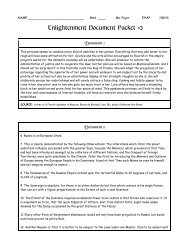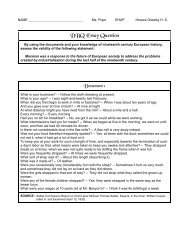WW1 Document Packet â Great Britain - Historyteacher.net
WW1 Document Packet â Great Britain - Historyteacher.net
WW1 Document Packet â Great Britain - Historyteacher.net
You also want an ePaper? Increase the reach of your titles
YUMPU automatically turns print PDFs into web optimized ePapers that Google loves.
NAME _____________________________ Mod ____ EHAP Ms. Pojer HGHS<br />
<strong>WW1</strong> <strong>Document</strong> <strong>Packet</strong> – <strong>Great</strong> <strong>Britain</strong><br />
<strong>Document</strong> 1<br />
The following excerpt is from a book by the American historian Sidney Bradshaw Fay, entitled Origins<br />
of the World War. It focuses on the problem, long debated by historians, of fixing responsibility for<br />
the outbreak of World War 1. This issue is complicated. Everyone agrees that the murder of the<br />
Austrian Archduke Francis Ferdinand by a Bosnian patriot at Sarajevo was the incident that touched<br />
off the war, but there is little agreement about the underlying causes of the war or the ultimate<br />
responsibility for the outbreak of hostilities.<br />
Fay's two-volume work on the causes of the war, first published in 1928, has stood the test of time<br />
and critical scholarship. To Professor Fay's credit is the fact that he waited until official records of<br />
events were available. In his first volume he explored the long-range causes of the war, extending his<br />
study far back into the 19th century. He devoted his entire second volume to the immediate causes of<br />
the war and examined' in detail the responsibilities of each major party.<br />
Questions: 1. In what way was each of the nations involved partly responsible for the<br />
outbreak of hostilities?<br />
2. Do you agree with Fay's analysis of individual responsibility?<br />
None of the powers wanted a European War. Their governing rulers and ministers, with very few<br />
exceptions, all foresaw that it must be a frightful struggle, in which the political results were not<br />
absolutely certain, but in which the loss of life, suffering, and economic consequences were bound to<br />
be terrible.<br />
Nevertheless, a European War broke out. Why? Because in each country political and military leaders<br />
did certain things which led to mobilizations and declarations of war, or failed to do certain things<br />
which might have prevented them. In this sense, all the European countries, in a greater or less<br />
degree, were responsible. One must abandon the dictum of the Versailles Treaty that Germany and<br />
her allies were solely responsible. It was a dictum exacted by victors from vanquished, under the<br />
influence of the blindness, ignorance, hatred, and the propagandist misconceptions to which war had<br />
given rise. It was based on evidence which was incomplete and not always sound. It is generally<br />
recognized by the best historical scholars in all countries to be no longer tenable or defensible. They<br />
are agreed that the responsibility for the War is a divided responsibility. But they still disagree very<br />
much as to the relative part of this responsibility that falls on each country and on each individual<br />
political or military leader.<br />
Some writers like to fix positively in some precise mathematical fashion the exact responsibility for<br />
the war. This was done in one way by the framers of Article 231 of the Treaty of Versailles. It has<br />
been done in other ways by those who would fix the responsibility in some relative fashion, as, for<br />
instance, Austria first, then Russia, France and Germany and England. But the present writer<br />
deprecates such efforts to assess by a precise formula a very complicated question, which is after all<br />
more a matter of delicate shading than of definite white and black. . . . Moreover, even supposing that
a general consensus of opinion might be reached as to the relative responsibility of any individual<br />
country or man for immediate causes connected with the July crisis of 1914, it is by no means<br />
necessarily true that the same relative responsibility would hold for the underlying causes, which for<br />
years had been tending toward the creation of a dangerous situation.<br />
One may, however, sum up very briefly the most salient facts in regard to each country.<br />
<strong>Document</strong> 2<br />
Sir Edward Grey made many sincere proposals for preserving peace; they all failed owing partly, but<br />
not exclusively, to Germany's attitude. Sir Edward could probably have prevented war if he had done<br />
either of two things. If, early in the crisis, he had acceded to the urging of France and Russia and<br />
given a strong warning to Germany that, in a European War, England would take the side of the<br />
Franco-Russian Alliance, this would probably have led Bethmann to exert an earlier and more effective<br />
pressure on Austria; and it would perhaps thereby have prevented the Austrian declaration of war on<br />
Serbia, and brought to a successful issue the "direct conversations" between Vienna and St.<br />
Petersburg. Or, if Sir Edward Grey had listened to German urging, and warned France and Russia early<br />
in the crisis, that if they became involved in war, England would remain neutral, probably Russia would<br />
have hesitated with her mobilizations, and France would probably have exerted a restraining influence<br />
at St. Petersburg. But Sir Edward Grey could not say that England would take the side of France and<br />
Russia, because he had a Cabi<strong>net</strong> nearly evenly divided, and he was not sure, early in the crisis, that<br />
public opinion in England would back him up in war against Germany. He could resign, and he says in his<br />
memoirs that he would have resigned, but that would have been no comfort or aid to France, who had<br />
come confidently to count upon British support. He was determined to say and do nothing which might<br />
encourage her with a hope which he could not fulfill.<br />
Therefore, in spite of the pleadings of the French, he refused to give them definite assurances until<br />
the probable German determination to go through Belgium made it clear that the Cabi<strong>net</strong>, and<br />
Parliament, and British public opinion would follow his lead in war on Germany. On the other hand, he<br />
was unwilling to heed the German pleadings that he exercise restraint at Paris and St. Petersburg,<br />
because he did not wish to endanger the Anglo-Russian Entente and the solidarity of the Triple<br />
Entente, because he felt a moral obligation to France, growing out of the Anglo-French military and<br />
naval conversations of the past years, and because he suspected that Germany was backing Austria up<br />
in an unjustifiable course and that Prussian militarists had taken the direction of affairs at Berlin out<br />
of the hands of Herr von Bethmann-Hollweg and the civilian authorities.


